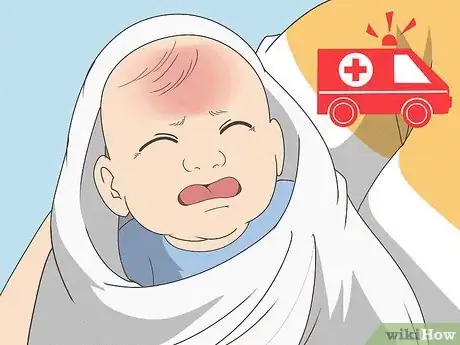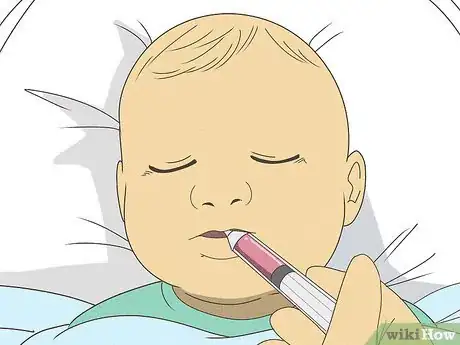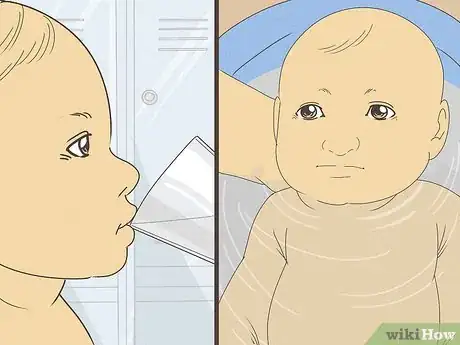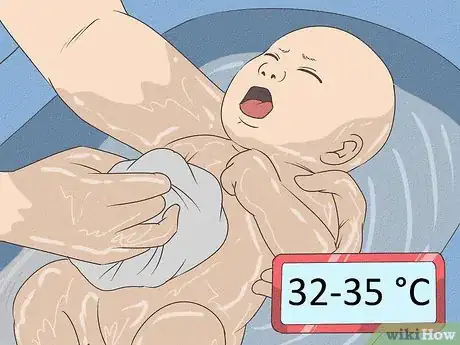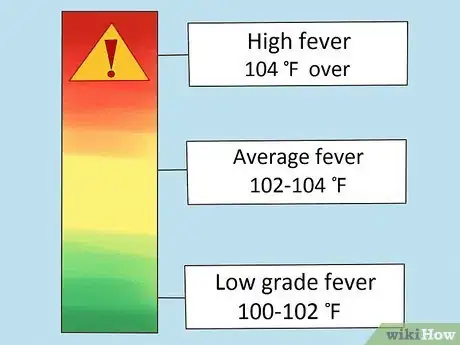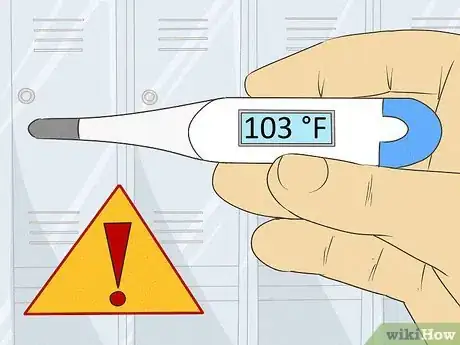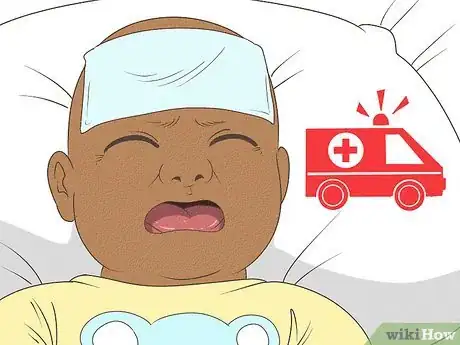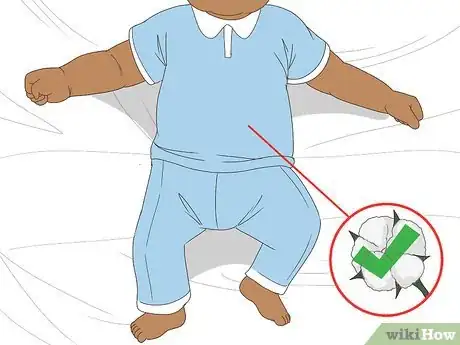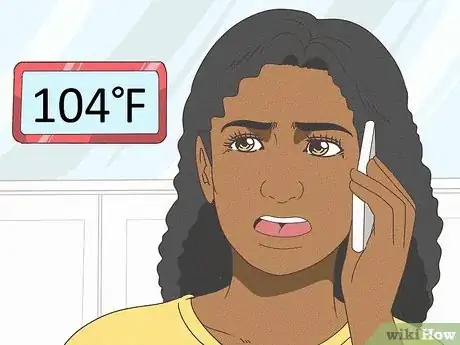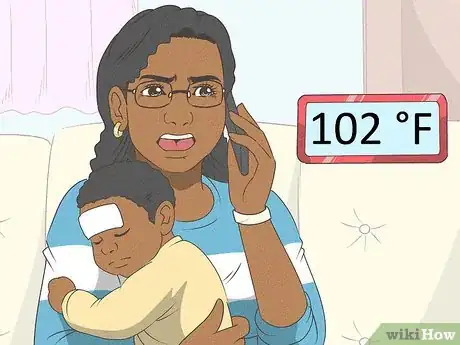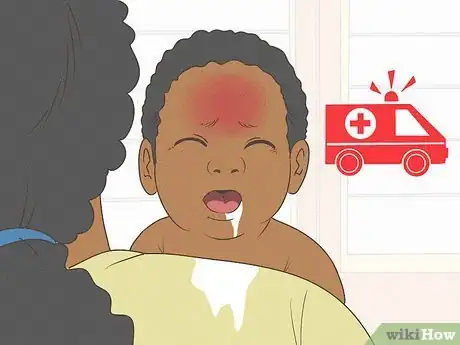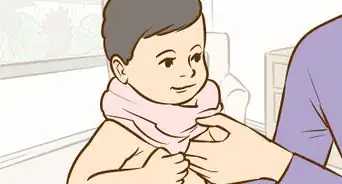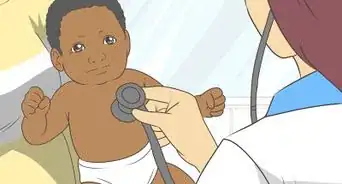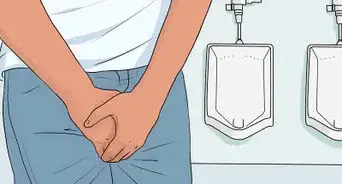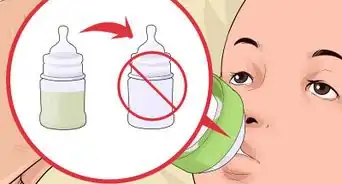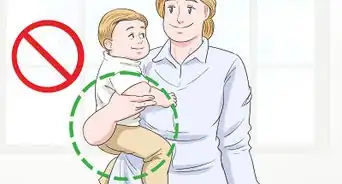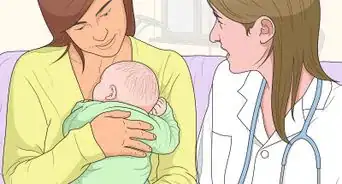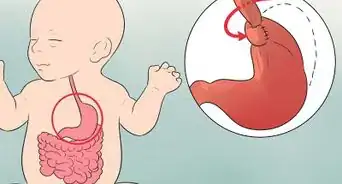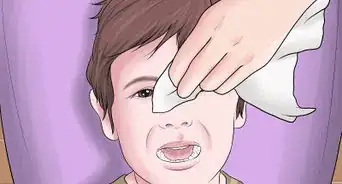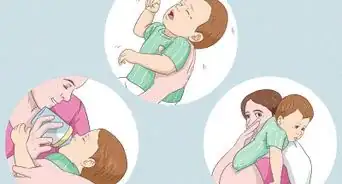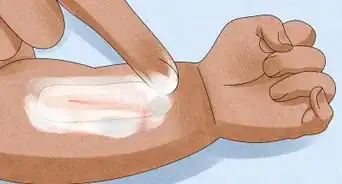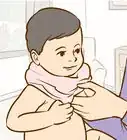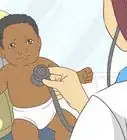This article was co-authored by Joel Warsh, MD and by wikiHow staff writer, Jessica Gibson. Dr. Joel Warsh is a board certified Pediatrician and the Owner & Founder of Integrative Pediatrics and Medicine in Los Angeles, California. With over a decade of experience, Dr. Warsh specializes in holistic and integrative medicine. He holds a Bachelor’s degree in Kinesiology and Health Sciences, a Master’s degree in Epidemiology and Community Health, and a Doctor of Medicine (MD) from Thomas Jefferson Medical College, where he was elected president of the Jefferson Pediatric Society. Dr. Warsh then completed his Pediatric Residency at Children’s Hospital of Los Angeles (CHLA), where he received the George Donnell Society Research Fellow.
There are 9 references cited in this article, which can be found at the bottom of the page.
wikiHow marks an article as reader-approved once it receives enough positive feedback. In this case, 100% of readers who voted found the article helpful, earning it our reader-approved status.
This article has been viewed 548,493 times.
When your baby is sick with a fever, it can feel like the worst thing in the world. You might think that there's not a lot you can do, but you can make your baby more comfortable, especially if they're old enough for fever-reducing medicine. Don't hesitate to call your baby's pediatrician for specific care instructions or for a little reassurance. We've also answered some of the most-searched-for questions about managing your baby's fever.
Steps
How can I reduce my baby's fever naturally?
-
1Give your baby extra fluids so they stay hydrated. Your baby's body is working hard to regulate their temperature and they need fluids to do it! If your baby is under 6 months old, give them as much breast milk or formula as they'll take. To encourage older babies to drink, it's safe to offer water or diluted fruit juice, too. Snuggle as you feed them—being held can make your baby feel reassured.[5]
- It's really important to prevent dehydration when your baby has a fever. Encouraging your baby to drink even for a minute or two can help them feel better and help them stay hydrated.
-
2Give your baby a lukewarm bath to lower their temperature. Fill a baby bathtub with about 2 inches (5.1 cm) of water that's between 90 and 95 °F (32 and 35 °C) and set them into it. Support your baby and gently splash the lukewarm water over their arms, legs, and tummy. You may sing or talk gently while you do this to help your baby relax.[6] [7]
- Never walk away from the baby while they're in the bath. If your baby can't control their head yet, don't forget to support their neck.
- A cold bath might seem like a good idea, but it can actually shock their system. If your baby shivers a lot, their body temperature will actually go up.</ref>[8]
What are fever levels for babies?
-
1A temperature of 100 to 102 °F (38 to 39 °C) is a low-grade fever. Your healthy baby's temperature is usually between 97 and 100.4 °F (36.1 and 38.0 °C), so anything over this is a low fever. Usually, in kids over 2 months, there's no need to worry and you don't need to break the fever since it's a sign that your baby's body is fighting something on its own.[9] [10]
- It's a good idea to keep taking your baby's temperature so you can see if it gets higher.
- When your baby has a low fever, they may seem a little fussy or clingy. Give your baby extra cuddles and attention to help them feel better.
- Monitor their symptoms. If the fever lasts 2-3 days and/or they seem lethargic, call your doctor.[11]
-
2A temperature of 102 to 104 °F (39 to 40 °C) is an average fever for babies over 3 months old. This might seem high, but it means that your baby's body is effectively fighting something. To make your baby more comfortable, you can give infant acetaminophen.[12]
- Watch for other symptoms of illness and keep track of how long your baby has had a fever. If you have to call the doctor or a nurse hotline, they'll ask you for details about your baby's fever.
-
3Anything over 104 °F (40 °C) is a high fever. A high temperature can be frightening—your baby is probably acting differently or lethargic. Call the doctor right away or take your baby to the emergency room, especially if their fever is over 106 °F (41 °C).[13] The medical team can find out what's causing the fever and they may give your baby fluids so they stay hydrated.[14]
- It's really important to get medical attention for a high fever. If it's after hours at the doctor's office, take your baby to the emergency room.
When should I take my baby to the doctor?
-
1Call the doctor if your newborn has a fever. If your baby is less than 2 months old and they have a temperature of 100.4 °F (38.0 °C) or higher, it can be scary! Don't hesitate to call your baby's pediatrician even if they don't have any other symptoms.[16] [17]
- The doctor will probably ask you to bring the baby in for an exam to rule out other medical conditions.
-
2Contact the pediatrician if your 3- to 6-month-old has a fever of 102 °F (39 °C). If your baby has a low fever and is acting normally, keep an eye on their temperature and make them as cozy as possible. If they're acting irritable or unusually tired and they have a fever, call the doctor. Hold your baby, snuggle them, or sing to reassure them while you talk to the doctor.[18]
- Your doctor might have you bring your baby in or they may give you medication instructions.
-
3Get medical attention if your baby's temperature doesn't improve after 1 day. If you have a baby that's older than 6 months and their temperature is over 102 °F (39 °C), see if acetaminophen or ibuprofen makes the fever go away. Call the doctor if the fever lasts for more than 1 day or they have other symptoms like diarrhea, coughing, or vomiting.[19]
- You should also call the doctor if your baby has a lower fever that lasts for more than 2-3 days.
Expert Q&A
-
QuestionIs a temperature of 99 a fever for a baby?
 Joel Warsh, MDDr. Joel Warsh is a board certified Pediatrician and the Owner & Founder of Integrative Pediatrics and Medicine in Los Angeles, California. With over a decade of experience, Dr. Warsh specializes in holistic and integrative medicine. He holds a Bachelor’s degree in Kinesiology and Health Sciences, a Master’s degree in Epidemiology and Community Health, and a Doctor of Medicine (MD) from Thomas Jefferson Medical College, where he was elected president of the Jefferson Pediatric Society. Dr. Warsh then completed his Pediatric Residency at Children’s Hospital of Los Angeles (CHLA), where he received the George Donnell Society Research Fellow.
Joel Warsh, MDDr. Joel Warsh is a board certified Pediatrician and the Owner & Founder of Integrative Pediatrics and Medicine in Los Angeles, California. With over a decade of experience, Dr. Warsh specializes in holistic and integrative medicine. He holds a Bachelor’s degree in Kinesiology and Health Sciences, a Master’s degree in Epidemiology and Community Health, and a Doctor of Medicine (MD) from Thomas Jefferson Medical College, where he was elected president of the Jefferson Pediatric Society. Dr. Warsh then completed his Pediatric Residency at Children’s Hospital of Los Angeles (CHLA), where he received the George Donnell Society Research Fellow.
Board Certified Pediatrician Technically, a fever starts at 100.4° (38° C), but anything from 100° to 102° F (37.8° to 38.9° C) is considered a low-grade fever. Always call your doctor with any concerns, especially if your baby has had a temperature for several days.
Technically, a fever starts at 100.4° (38° C), but anything from 100° to 102° F (37.8° to 38.9° C) is considered a low-grade fever. Always call your doctor with any concerns, especially if your baby has had a temperature for several days. -
QuestionWhen should I call the doctor for baby fever?
 Joel Warsh, MDDr. Joel Warsh is a board certified Pediatrician and the Owner & Founder of Integrative Pediatrics and Medicine in Los Angeles, California. With over a decade of experience, Dr. Warsh specializes in holistic and integrative medicine. He holds a Bachelor’s degree in Kinesiology and Health Sciences, a Master’s degree in Epidemiology and Community Health, and a Doctor of Medicine (MD) from Thomas Jefferson Medical College, where he was elected president of the Jefferson Pediatric Society. Dr. Warsh then completed his Pediatric Residency at Children’s Hospital of Los Angeles (CHLA), where he received the George Donnell Society Research Fellow.
Joel Warsh, MDDr. Joel Warsh is a board certified Pediatrician and the Owner & Founder of Integrative Pediatrics and Medicine in Los Angeles, California. With over a decade of experience, Dr. Warsh specializes in holistic and integrative medicine. He holds a Bachelor’s degree in Kinesiology and Health Sciences, a Master’s degree in Epidemiology and Community Health, and a Doctor of Medicine (MD) from Thomas Jefferson Medical College, where he was elected president of the Jefferson Pediatric Society. Dr. Warsh then completed his Pediatric Residency at Children’s Hospital of Los Angeles (CHLA), where he received the George Donnell Society Research Fellow.
Board Certified Pediatrician Call your doctor right away if your baby is less than 2 months old. If your little one is older than 2 months, call the doctor if their fever doesn't go away within 2-3 days.
Call your doctor right away if your baby is less than 2 months old. If your little one is older than 2 months, call the doctor if their fever doesn't go away within 2-3 days. -
QuestionWhen should you be worried about a fever?
 Joel Warsh, MDDr. Joel Warsh is a board certified Pediatrician and the Owner & Founder of Integrative Pediatrics and Medicine in Los Angeles, California. With over a decade of experience, Dr. Warsh specializes in holistic and integrative medicine. He holds a Bachelor’s degree in Kinesiology and Health Sciences, a Master’s degree in Epidemiology and Community Health, and a Doctor of Medicine (MD) from Thomas Jefferson Medical College, where he was elected president of the Jefferson Pediatric Society. Dr. Warsh then completed his Pediatric Residency at Children’s Hospital of Los Angeles (CHLA), where he received the George Donnell Society Research Fellow.
Joel Warsh, MDDr. Joel Warsh is a board certified Pediatrician and the Owner & Founder of Integrative Pediatrics and Medicine in Los Angeles, California. With over a decade of experience, Dr. Warsh specializes in holistic and integrative medicine. He holds a Bachelor’s degree in Kinesiology and Health Sciences, a Master’s degree in Epidemiology and Community Health, and a Doctor of Medicine (MD) from Thomas Jefferson Medical College, where he was elected president of the Jefferson Pediatric Society. Dr. Warsh then completed his Pediatric Residency at Children’s Hospital of Los Angeles (CHLA), where he received the George Donnell Society Research Fellow.
Board Certified Pediatrician Call your doctor right away if your baby seems extra tired, has trouble breathing, or throws up constantly.
Call your doctor right away if your baby seems extra tired, has trouble breathing, or throws up constantly.
Warnings
- It's scary to have a baby with a fever, which is why you shouldn't hesitate to call their pediatrician. The doctor can give you the best recommendations that are specific to your child. They can also reassure you if there's nothing for you to worry about.⧼thumbs_response⧽
- Don't give your baby aspirin to reduce their fever since it's associated with Reye's syndrome which can disrupt the nervous system.⧼thumbs_response⧽
References
- ↑ Joel Warsh, MD. Board Certified Pediatrician. Expert Interview. 20 July 2021.
- ↑ https://www.stanfordchildrens.org/en/topic/default?id=fever-in-a-newborn-90-P02662
- ↑ Joel Warsh, MD. Board Certified Pediatrician. Expert Interview. 20 July 2021.
- ↑ http://www.med.umich.edu/mott/pdf/mott-tylenol-ibuprofen-dosage-chart.pdf
- ↑ https://www.seattlechildrens.org/conditions/a-z/fever-0-12-months/
- ↑ Joel Warsh, MD. Board Certified Pediatrician. Expert Interview. 20 July 2021.
- ↑ https://www.nationwidechildrens.org/family-resources-education/family-resources-library/when-your-newborn-has-a-fever
- ↑ https://kidshealth.org/en/parents/fever.html
- ↑ Joel Warsh, MD. Board Certified Pediatrician. Expert Interview. 20 July 2021.
- ↑ https://www.seattlechildrens.org/conditions/a-z/fever-0-12-months/
- ↑ Joel Warsh, MD. Board Certified Pediatrician. Expert Interview. 20 July 2021.
- ↑ https://www.seattlechildrens.org/conditions/a-z/fever-0-12-months/
- ↑ Joel Warsh, MD. Board Certified Pediatrician. Expert Interview. 20 July 2021.
- ↑ https://www.seattlechildrens.org/conditions/a-z/fever-0-12-months/
- ↑ https://kidshealth.org/en/parents/fever.html
- ↑ Joel Warsh, MD. Board Certified Pediatrician. Expert Interview. 20 July 2021.
- ↑ https://www.mayoclinic.org/healthy-lifestyle/infant-and-toddler-health/in-depth/healthy-baby/art-20047793
- ↑ https://www.mayoclinic.org/diseases-conditions/fever/in-depth/fever/art-20050997
- ↑ https://www.mayoclinic.org/healthy-lifestyle/infant-and-toddler-health/in-depth/healthy-baby/art-20047793
- ↑ https://www.mayoclinic.org/healthy-lifestyle/infant-and-toddler-health/in-depth/thermometer/art-20047410
